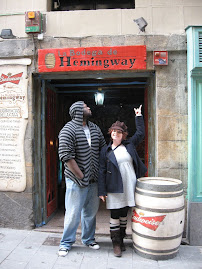Chapter 3, "Divided Society"
"society works to divide up the human community and oppress some of its members" (34).
"Disabled people have existed predominantly as marginal figures, their contributions and perspectives are not generally noted" (36).
Linton discusses the role of voice (vox) in the rhetorics of disability and her statement is particularly relevant to discussions of online autism communities: "The most fundamental problem, though, is that disabled people's voices are almost completely absent from this picture, and so the understanding of disabled people's place in these situations is filtered through the experience of people who have never been in that place" (37).
Distinct categories that disabled people have occupied in Western history (Linton is referencing and elaborating on categories first described by Hanks and Hanks):
1. Pariah--"disabled people are denied most if not all claims to succor and to rights by the dominant nondisabled majority and are deemed a threat to the group itself" (38). "despised by society." "Denying or withholding resources or protection is one set of responses to disabled people deemed pariahs" (39). Nazi Germany.
Also, published reports of institutions and schools abusing autistic children and adults fits within this discussion. Numerous examples are seen in the media and noted on Autismvox.com in regard to "electroshock therapy," neglect, and physical and emotional abuse. "A most profound example of withholding care and 'succor" can be seen in the United States, in the history of many of our institutions and asylums" (40).
"Disabled people around the world who are deemed pariahs by their own families and communities have lived through the terrible pain of being denied succor by the very persons to whom it would be most natural to turn. Practices ranging from withholding attention, food, love, and education to denying them life itself have been documented" (45).
2. Economic and Social Liability--"disabled people's being seen as impairing the economic well-being, as well as the vitality and viability, of a society" (45). The disabled are thought to drain economic resources and "deflect attention from other needs" (45). Rhetoric involves the "lifeboat image" of a "society abandoning the 'weaker' members to aid the survival of the group.
Couple this "lifeboat image" with technology and "There are at least two compteting ideas at work here. One is the belief that in the modern, industrialized world scientific and technological competence, along with advanced humanitarian and moral development, would lead the way toward the highest level of care and of concern ever evidenced. However, those modernist ideals mean the society would not tolerate being bogged down by those who can't keep up, who are thought to drain resources, or who remind us in any way of the limitations of our scientific capabilities" (46).
Economic concerns are particularly relevant to discussions on autism, especially considering the enormous costs that ABA, medication, chelation (if a parent chooses to go in that direction), tutoring, etc can cost parents.
Local responsibility of raising disabled child and, possibly, caring for disabled adult.
Important to note the distinction of those "in need" who are worthy of help and those who are not (47). Another important note: "dependency was deemed antithetical to citizenship" (qtd in Linton 48). Interesting for discussion on those with mental disabilities--what constitutes active citizenship (especially considering the focus on citizenship in the early American institutions as discussed in Trent), who gets to have citizenship, does one have to contribute economically to have citizenship, and how might all of this impact those who are mentally disabled? (Perhaps something to discuss in the corporitization/ethics of autism?)
Also, important to note: "America's glorification of independence has not served disabled people well" (48).
Interesting point to note for "supranatural section": "In the nineteenth century, there was a shift from the belief that disability was caused by supernatural agency to a biological explanation that held that treatment, or some form of rehabilitation, was the logical response to disability" (48). Discussion also found in Longmore... Thoughts to consider: how does our ideological shift during the 18th and 19th centuries influence autism treatments in the 21st century? Seems to be 2 rhetorics/discourses going on: Media--autism as a reflection of some demon, spirit, supernatural being, angel existing in the body of the individual. And, Media--autism as a biological defect or some active poison wrecking havoc on the autistic's body. Point to note is that there is some "other" at fault for the disabilities of the individual.
"Although medicine didn't overtly claim expertise in reducing the economic liability posed by disabled people, it did corner the market on attempts to contain the perceived negative social impact of disability" (49).
"The institutions that emerged in the twentieth century became teaching hospitals and research centers" (49).
"In the current climate in the United States of managed health care, there is a deep fear among disabled people that our lives will be weighed on an economic scale" (50).
Michael Berube writes: "I do not want to see a world in which human life is judged by the kind of cost-benefit analysis that weeds out those least likely to attain self-sufficiency and to provide adequate 'returns' on social investments" (qtd in Linton 51).
3. Tolerant Utilization--disabled people "are allowed to participate to the extent that they have the ability to fulfill certain roles and duties designated by the nondisabled majority as necessary" (51). "[T]hese situations are ripe for exploitation" (51)--freakshows and carnival acts.
4. Limited Participation--"disabled people's roles and status are largely derived from their ability to be productive in terms of the standards set by the dominant majority"(53). "[I]t is up to the individual to demonstrate worth and competence" and this model promotes "a false sense of acceptance because the norms and standards of the able-bodied majority are imposed and held up as the ideal to which all should aspire" (53). "Limited participation indicates the society's willingness to accept a disabled person among its ranks in any domain in which she or he can 'keep up' with the nondisabled" (53).
5. Laissez-Faire--"a steadfast relation to the protective group, despite handicap," (qtd in Linton 53) and the "obligation of the extended family to shelter and provide for its unfortunates continues, whether they are able to give their labor or not" (qtd in Linton 53). For Linton, this term means that society accepts the "idea of noninterference" as applied to social structures. "The society makes no effort to reconstruct its goals or acceptable means of achieving them to reflect a broader range of citizens, the society has accepted a laissez-faire approach to disability" (54). "Disabled people then are left in the uneviable position of having to keep up with norms and standards but with no opportuntity to shape them" (54).
6. Participation and Accomodation--"concerted efforts to accomodate all members of the group and to adapt the procedures and standards typically imposed to reflect a range of abilities, interests, and needs. This does not mean lowering standards in an absolute sense; it means that greater flexibility is evident and a broader range of objectives are set. These actions are based on moral, practical, religious, and/or rights-based approaches to full participation of all members of society" (54).
Monday, June 25, 2007
Subscribe to:
Post Comments (Atom)








No comments:
Post a Comment